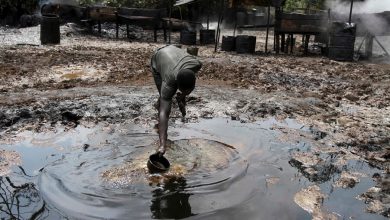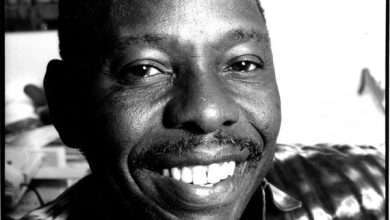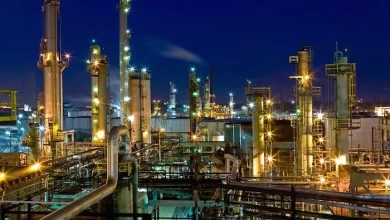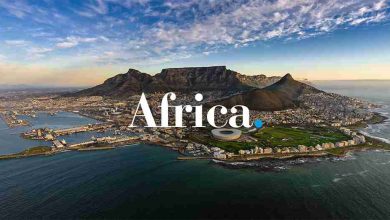Cash Can’t Fix the Nigeria Village Ruined by Shell’s Oil
As canoes glide past mangroves blackened by oil in the Niger River delta, two dozen children splash around in a creek covered by a sheen of crude while families take shelter from the punishing midday sun in half-built houses.
Once a bustling farming and fishing town in the region of Ogoniland, Bodo has become a poster child in Nigeria for the devastating impact on local communities caused by the leakage of about 240,000 barrels of crude a year in the delta, close to the amount that spilled in 1989 when the Exxon Valdez tanker ran aground off Alaska.
While Royal Dutch Shell Plc paid 55 million pounds ($77 million) in compensation last year, residents have spent almost all of it and can’t finish their new homes. Standing at the waterfront, Christian Kpandei, a 56-year-old pastor, surveys the row of unfinished houses near the bank.
“This is why they are crying,” said Kpandei, who led the compensation campaign against Shell. “There’s no money again.”
Twenty years after the oil-pollution crisis in the Niger delta shot to world attention when the then military government hanged the author and environmentalist, Ken Saro-Wiwa, residents in the region are seething with anger again that the problem hasn’t been fixed. Militants who carried out an armed rebellion in the region from 2006 to 2009, cutting as much as a quarter of production in Africa’s biggest oil producer, are threatening to resume their campaign. While President Muhammadu Buhari is promising to accelerate clean-up efforts, he says he understands the communities’ anger.
“The devastation caused by oil spillage has destroyed many lives and livelihoods,” Buhari said in January during a visit to the Kenyan capital, Nairobi. It “is clearly one of the reasons why many people in that region lost faith in government and resorted to the many criminal activities we are seeing.”
Shell’s agreement to pay the money to compensate more than 15,000 of the 69,000 Bodo residents, mostly fishermen, came after a three-year fight in a London court. The amount included 20 million pounds to develop the entire community in an area where more than 50 percent of the population live on $1 a day, according to Nigeria’s statistics agency.
Two more delta communities, Ogale and Bille in Rivers state, have filed cases in a London court this week alleging Shell is responsible for oil spills since at least 1989 that contaminated property, farmland and waterways, according to an action filed by Leigh Day, the law firm representing them and which handled the Bodo case.
Jurisdiction Challenge
Shell is “at an early stage of reviewing the claims made by the Bille and Ogale communities” and the company intends to challenge the jurisdiction of the London court over its Nigerian operations, Precious Okolobo, a Lagos-based spokesman for Shell’s Nigerian unit, said in e-mailed comments on Thursday.
In Bodo, part of the reason for clean-up delays is that local residents say they don’t trust outside contractors and some of the community leaders to carry out the work and believe the money should be paid directly to the residents instead.
“They will manipulate that money and they will not do a good, clean job,” said Monday Zopo, a 46-year-old fisherman in Bodo with four children. “That is why many people are saying they should share the money.”
Shell said it can’t decontaminate the area without the local community’s approval.
The company is “ready to play its part in the clean-up of Bodo,” Okolobo said. “A successful clean-up exercise needs the consistent support of the community.”
Cash Payments
Demands by local communities for cash payments instead of funding of clean-up operations is a mistake, said Celestine Akpobari, the national coordinator of the Ogoni Solidarity Forum.
“It is sad, the people don’t understand the value of having an environment that is good,” Akpobari said in an interview in Port Harcourt, the Nigerian oil industry hub. “That is foolishness of the worst order.”
In Ogoniland alone, reversing the impact of contaminated groundwater and polluted ecosystems could cost at least $1 billion and take three decades, the United Nations Environment Programme said in a 2011 report. While Nigeria’s finances and economy have been hit by the 39 percent plunge in Brent crude prices in the past year, Buhari has promised to accelerate and implement the UN recommendations.
Shell has begun to implement the UN report recommendations, but coordinated action is also needed from the government, communities and oil and gas industry, Okolobo said.
Onshore Production
Shell has frequently been the target of complaints because it was the first and biggest company to develop onshore production. It explored the area in 1939 after it won a concession for all of Nigeria during British colonial rule. Exports began in 1958, and oil majors including Chevron Corp., Eni SpA, Exxon Mobil Corp. and Total SA followed.
While Shell stopped production in Ogoniland in 1993 after violent protests, its trunk lines supplying the Bonny Export Terminal on the coast from outlying fields still pass through the area. Pipelines in the delta are frequent targets for oil thieves.
The government said this week it’s deploying more troops to battle sabotage after a leak forced crude loadings to be suspended last month at a major export terminal. Shell declared force majeure — a legal status protecting a party from liability if it can’t fulfill a contract for reasons beyond its control — on shipments from the Forcados oil terminal.
The company has drawn criticism for decades over spills, most recently by London-based rights group Amnesty International, which in November accused it of failing to decontaminate four sites. Shell says it’s committed to clean up all spills from its facilities, regardless of the cause.
‘Contaminated Area’
In neighboring Goi, Eric Dooh, a farmer who owns some of the land, marches down to the water past a government sign that declares: “Prohibition! Contaminated Area, Please Keep Off.” Disco music blared in the background from a nearby parked Toyota Highlander SUV as Dooh gestured at the blackened wasteland around him.
“Where I am standing is my investment site, which I inherited from my father,” he said while being watched by three young, muscular, bare-chested men sitting under a palm tree drinking beer mid-afternoon. “It is badly impacted with crude oil.”
After the spills, Dooh joined three farmers with the support of the environmental group Friends of the Earth and filed a lawsuit in 2008 against Shell.
The company said its pipelines were ruptured due to sabotage. In December, a court of appeal in The Hague ruled that Dooh’s case could be heard in the Netherlands and told Shell to provide internal company documents related to the spills.
Shell is “disappointed” by the Dutch court’s decision, Okolobo said. It should have declined to exercise jurisdiction over the company’s Nigerian unit and the case should be heard in the West African nation, he said.
Unlike some residents of Bodo, Dooh, 48, said that if he wins compensation he will use the money to fund a cleanup of his land.
“You cannot invest here without cleaning,” he said. “Here we need proper development so that money can come in after they have cleaned up.”
– Bloomberg




